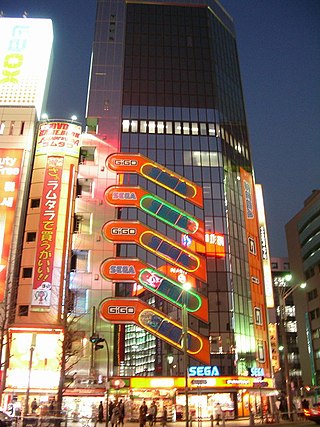
An amusement arcade is a venue where people play arcade games, including arcade video games, pinball machines, electro-mechanical games, redemption games, merchandisers, or coin-operated billiards or air hockey tables. In some countries, some types of arcades are also legally permitted to provide gambling machines such as slot machines or pachinko machines. Games are usually housed in cabinets. The term used for ancestors of these venues in the beginning of the 20th century was penny arcades.

Yu Suzuki is a Japanese game designer, producer, programmer, and engineer, who headed Sega's AM2 team for 18 years. Considered one of the first auteurs of video games, he has been responsible for a number of Sega's arcade hits, including three-dimensional sprite-scaling games that used "taikan" motion simulator arcade cabinets, such as Hang-On, Space Harrier, Out Run, and After Burner, and pioneering polygonal 3D games such as Virtua Racing and Virtua Fighter, which are credited with popularizing 3D graphics in video games, as well as the critically acclaimed Shenmue series. As a hardware engineer, he led the development of various arcade system boards, including the Sega Space Harrier, Model 1, Model 2, and Model 3, and was involved in the technical development of the Dreamcast console and its corresponding NAOMI arcade hardware.

Crazy Taxi is a series of racing video games that was developed by Hitmaker and published by Sega. The first game appeared in arcades in 1999 and was very successful, prompting Sega to port the arcade version to their Dreamcast console in 2000. It is the third best-selling Dreamcast game in the United States, selling over a million copies. The game was later ported to the PlayStation 2, Nintendo GameCube, and PC with sequels also appearing on the Xbox, Game Boy Advance, and PlayStation Portable systems.
Arika is a Japanese video game developer and publisher. It was formed in 1995 by former Capcom employees, originally as ARMtech K.K, later named Arika. The name of the company is the reverse of the name of the company's founder, Akira Nishitani, who along with Akira Yasuda, created Street Fighter II. Arika's first game was Street Fighter EX. It was successful and was followed up with two updates, and it's two sequels Street Fighter EX2 and Street Fighter EX3. In 2018, they released a spiritual successor to both Street Fighter EX and Fighting Layer, titled Fighting EX Layer. From 2019 to 2021, Arika collaborated with Nintendo to create the battle royale games Tetris 99, Super Mario Bros. 35, and with Bandai Namco for Pac-Man 99. Arika is also known for the Tetris: The Grand Master series, the Dr. Mario series, and the Endless Ocean series.

Daigo Umehara is a Japanese arcade fighting video game player. He specializes in 2D arcade fighting games, mainly those released by Capcom. Known as "Daigo" or "The Beast" in the West and "Umehara" or "Ume" in Japan, Daigo is one of the world's most famous Street Fighter players and is often considered its greatest as well. His longevity is seen as an incredibly rare thing in the world of competitive video games. He currently holds a world record of "the most successful player in major tournaments of Street Fighter" in the Guinness World Records and is a six time Evo Championship Series winner.

The first Brooklyn Chinatown, was originally established in the Sunset Park area of the New York City borough of Brooklyn. It is one of the largest and fastest growing ethnic Chinese enclaves outside of Asia, as well as within New York City itself. Because this Chinatown is rapidly evolving into an enclave predominantly of Fuzhou immigrants from Fujian Province in China, it is now increasingly common to refer to it as the Little Fuzhou or Fuzhou Town of the Western Hemisphere; as well as the largest Fuzhou enclave of New York City.
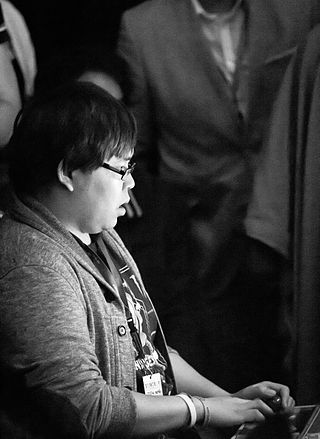
Justin Wong, occasionally shortened to just Jwong, is a formerly American and now Canadian professional fighting game player.

Chinatowns are enclaves of Chinese people outside of China. The first Chinatown in the United States was San Francisco's Chinatown in 1848, and many other Chinatowns were established in the 19th century by the Chinese diaspora on the West Coast. By 1875, Chinatowns had emerged in eastern cities such as New York City, Boston, and Philadelphia. In 1882, the Chinese Exclusion Act, which barred Chinese immigration to the United States, was passed into law. In 1943, the Magnuson Act repealed the Chinese Exclusion Act, and the population of Chinatowns began to rise again. In the 2010s, the downturn in the U.S. economy caused many Chinese Americans to return to China.

East Broadway is a two-way east–west street in the Chinatown, Two Bridges, and Lower East Side neighborhoods of the New York City borough of Manhattan.

Super Street Fighter IV: Arcade Edition is an update to Super Street Fighter IV, originally released in 2010 for the arcades. It has been ported in 2011 for Microsoft Windows, PlayStation 3, and Xbox 360 and in 2017, the Xbox 360 version became backward compatible on the Xbox One.

Dead or Alive 5 Ultimate is a fighting game in the Dead or Alive series, developed by Team Ninja, and released by Tecmo Koei for the PlayStation 3 and Xbox 360 in September 2013. It was followed by an arcade edition later in 2013. It is the first arcade game to be released by Koei Tecmo since Dead or Alive 2 Millenium in 2000.
The fighting game community, often abbreviated to FGC, is a collective of video gamers who play fighting games such as Marvel vs. Capcom, Mortal Kombat, Soulcalibur, Street Fighter, Guilty Gear, The King of Fighters, Blazblue, Super Smash Bros., Tekken, Dead or Alive, Samurai Shodown, and many others. The fighting game community started out small in the late 1990s and throughout the 2000s referred to as the grassroots era, but it has grown to a larger scale in the 2010s, with many tournaments being held around the world. This is predominantly due to the rise of esports and digitized viewing habits on live streaming sites such as Twitch.
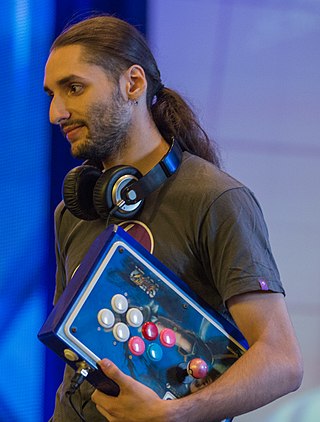
Christopher Gonzalez, also known as NYChrisG, is an American competitive gamer, specializing in fighting games. He is considered one of the top Ultimate Marvel vs. Capcom 3 players. He is also the EVO 2016 champion for Ultimate Marvel vs. Capcom 3.
NESiCAxLive is a digital distribution system for arcade video games made by Taito. It is similar to the SEGA ALL.Net game distribution system. Taito uses NESiCAxLive to distribute not only its own games, but also allows other companies to use it as a publication platform. On its introduction SNK, Cave, and Arc System Works had agreed to distribute games on NESiCAxLive.Currently 8 games are operated as alone running titles and 29 titles as downloadable titles on candy cabinets.

There are multiple Chinatowns in the borough of Queens in New York City. The original Queens Chinatown emerged in Flushing, initially as a satellite of the original Manhattan Chinatown, before evolving its own identity, surpassing in scale the original Manhattan Chinatown, and subsequently, in turn, spawning its own satellite Chinatowns in Elmhurst, Corona, and eastern Queens.

Alex Valle, also known as CaliPower and Mr. Street Fighter, is a Peruvian-American professional fighting game player. Valle is mainly a Ryu specialist and is considered one of the most influential people within the fighting game community.
Jing Fong is a Chinese dim sum restaurant that was originally located on the second floor of 20 Elizabeth Street in Chinatown, Manhattan, New York City. It had a large seating capacity accommodating over 800 seats with 20,000 square feet.

Chinatown Fair Family Fun Center is a video arcade center located on Mott Street in Chinatown, Manhattan. Historically, the arcade catered toward competitive fighting games. The original arcade opened in 1944 and closed in February 2011, but reopened in May 2012 under different management. Chinatown Fair has been widely regarded as New York City's "last great arcade".
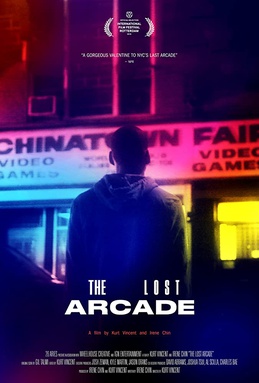
The Lost Arcade is a 2015 American documentary film about the influence of the Chinatown Fair arcade on the fighting game community and New York City as a whole. The film was directed by Kurt Vincent and produced by Irene Chin, with executive producers Evan Krauss, Kyle Martin, Jason Orans, Alex Scilla, and Joshua Y. Tsui. The documentary features multiple interviews with professional players, in addition to players connected with Chinatown Fair and the new arcade Next Level.
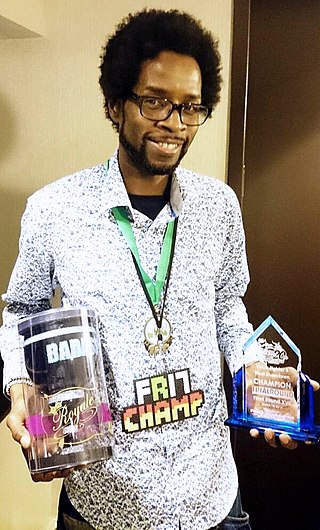
Ryan Joseph Hart, also known as Prodigal Son, Tsuujin, Robotnik, The Terminator and NeriahSensei, is a British professional fighting game player. He specialises in 2D and 3D fighter games released by Capcom, Bandai Namco, Sega, Midway, NetherRealm Studios and SNK. Ryan holds numerous National, European and World titles and has won the Evolution Championships twice. Hart also holds four world records within the Guinness World Record's for most international Street Fighter competition wins, most well-travelled fighting game champion, the longest winning streak on Street Fighter IV, and the most consecutive opponents on Street Fighter V. While Hart is predominantly known for his professional gaming career, he is also a commentator, tournament organiser, author, presenter, event host, model, translator and content creator.















